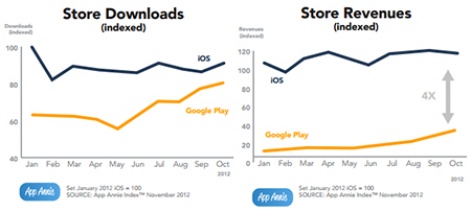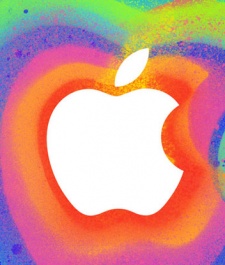At the heart of the story was a number published by analytics specialist App Annie.
As part of the firm's new monthly App Annie Index report, the company claimed Apple's monthly App Store revenues had grown 12.9 percent in 2012.
It was a figure the net jumped on, generating scores of stories on notable sites, some warning such growth when compared to App Annie's 313 percent growth figure for Google Play - was worrying for Apple.
The numbers game
Such comparisons, it would appear, didn't go down all too well at Apple.
The giant appears to have got in contact with one of the sites that published the original story VentureBeat to rubbish the numbers, claiming it's own figures made App Annie's 12.9 percent look rather out of place.

An excerpt from App Annie's Index
The Apple rep who contacted VentureBeat reportedly pointed to the fact that Apple had paid out a total of $4 billion to developers since the App Store launched in 2008 as of Q1 2012 a figure that then rose to $6.5 billion by the time of the firm's 23 October iPad mini unveiling.
Such figures led VentureBeat to conclude that Apple sold $3.6 billion worth of apps between the end of January and end of October in 2012 a stat that didn't sit well with App Annie's 12.9 percent figure.
Indeed, VentureBeat suggested growth was more likely to be around 200 percent.
A matter of angles
"The worst part of this story? I personally reported on those App Annie numbers this morning - uncritically - and I should have known better," offered VentureBeat's John Koetsier in his follow up article.
"The clues are in the data that Apple has already provided. It doesn't make me feel any better, but The Next Web did the same thing, as did Mashable, and PCWorld, among others.
"I've asked App Annie for an explanation and have not received one yet, despite some back-and-forthing with PR reps. App Annie's CEO, Bertrand Schmitt, is in Beijing, which isn't helping. What I've gotten so far is that there may be a difference in how the two companies are defining revenue.
"That, I would suggest, is an understatement."
The bizarre thing is, just hours after this report which, in my view, attempts to trash App Annie's numbers was published, VentureBeat posted a follow up, concluding that both Apple and App Annie are, in fact, correct.
They're just looking at the stats from different angles.
Lessons
As detailed in the latest article, Apple's figures relate to year-on-year growth, whereas App Annie's numbers for both the App Store and Google Play are specifically focused on set months in 2012: January compared to October.
"Our objective is to inform business decisions and create constructive discussion in the industry, so we're happy to engage with all those who read our reports and offer more analysis, insight and advice," said App Annie in a blog post responding to VentureBeat's articles.
"iOS's October 2012 monthly revenues were 12.9 percent higher than their monthly revenues in January 2012. Google Play's October 2012 monthly revenues were 311 percent higher than their monthly revenues in January 2012.
"We are comparing two single months of the year. We are not compounding growth across these months."
Now, I'm not attempting to poke fun at VentureBeat, here. The site has, to its credit, kept its readers up to date with developments as they have arisen, even if it was in my view rather too eager to dismiss App Annie's take on Apple's say so.
We're all, also, guilty of mistakes and lapses in judgement. Which is exactly why there are lessons to be learned here.
A word of warning
On PocketGamer.biz, we deal with scores of stats and analytics from all kinds of sources every month. Some make it to these pages, and some don't naturally, a lot of those that do offer an interesting take on the market.
That's because, there's not much of a story in the status quo: interest develops when things change, and for developers, it's important they know which way the wind is blowing.
By the same token, both App Annie and Apple's numbers are relevant. Neither is lying Apple regularly updates the press at launch events, while App Annie's figures are sourced from 150,000 apps from publishers that it claims represent 40 percent of the top 100 operating within the iOS ecosystem.
They're not, of course, set in stone, but they and those published by various other analytics specialists and ad networks have a role to play because, firstly, they detail numbers that platform holders often wouldn't wish to make public, and secondly, they enable developers to compare marketplaces like for like.
Readers should never take any such figures as gospel, but rather use a combination of sources to paint a picture. Likewise, everyone developers, journalists all included should surely understand that first-party numbers are almost always going to be designed to paint a company in a certain light.
Numbers don't have to be wrong to be entirely one-sided, and everything everyone says should be taken with a pinch of salt.
Including me, I guess.





















